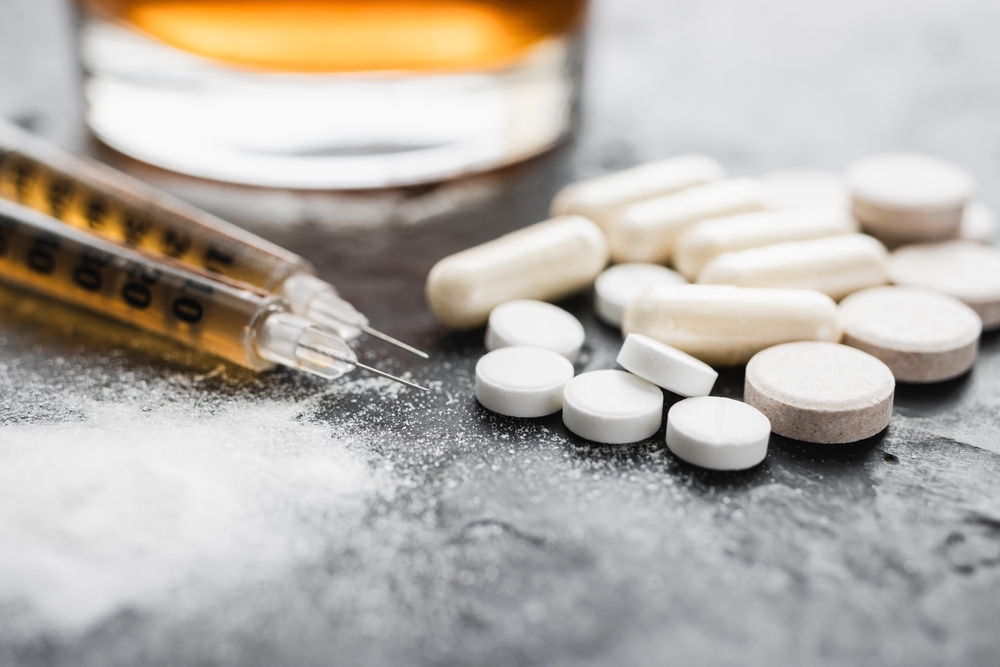
Written by:

Medically Reviewed by:
Last Updated:
October 21st, 2025
Ecstasy Addiction | Signs, Symptoms & Effects
What is Ecstasy?
Ecstasy, also known as MDMA, is a synthetic drug that alters mood and perception. It is commonly associated with party and rave culture due to its stimulant and hallucinogenic effects. Ecstasy increases the activity of neurotransmitters like serotonin, dopamine, and norepinephrine, leading to heightened energy, emotional warmth, and sensory distortions. While often sold in pill or tablet form, it can also be found as a powder or capsule. Despite its reputation as a “party drug,” Ecstasy carries significant risks, including dehydration, increased heart rate, and potential long-term effects on brain chemistry.
What is Ecstasy Addiction?
Ecstasy addiction refers to the compulsive use of the drug despite negative consequences. While Ecstasy is not considered physically addictive in the same way as opioids or alcohol, it can lead to psychological dependence. Users may develop a habit of taking Ecstasy to enhance social experiences, escape reality, or cope with emotions. Over time, the brain becomes reliant on the drug to produce feelings of euphoria and connection, making it difficult to function without it. This pattern of use can lead to cravings, tolerance (needing higher doses for the same effect), and withdrawal symptoms like depression, fatigue, and anxiety when not using the drug.
What Makes Ecstasy Addictive?
The addictive nature of Ecstasy stems from its impact on brain chemistry, particularly its influence on serotonin levels. Serotonin is a key neurotransmitter responsible for mood regulation, emotional stability, and social bonding. When Ecstasy floods the brain with serotonin, it creates intense pleasure and well-being. However, this surge is followed by a significant depletion, leading to emotional crashes and a desire to use the drug again to regain those positive feelings. Additionally, the reinforcing cycle of using Ecstasy in social settings, where users associate the drug with happiness, energy, and connection, can lead to habitual use and dependence over time.
Ecstasy Addiction in the UK
Ecstasy continues to pose significant health risks in the UK, as evidenced by recent statistics. In 2022, there were 51 deaths attributed to MDMA/ecstasy use in England and Wales. While this represents a decrease from the peak of 92 deaths in 2018, the number remains concerning.
These developments underscore the persistent dangers associated with ecstasy use in the UK, highlighting the need for harm reduction strategies and education to mitigate the risks.
Signs and Symptoms of Ecstasy Addiction
Ecstasy addiction can manifest in various physical, psychological, and behavioural symptoms. While MDMA is often considered less physically addictive than substances like opioids or alcohol, its powerful psychological effects can lead to compulsive use, dependence, and serious consequences.
Physical Signs of Ecstasy Addiction
- Increased energy and alertness: A person using ecstasy may exhibit excessive energy, restlessness, and an inability to stay still.
- Dilated pupils: One of the most noticeable physical symptoms, as ecstasy stimulates the nervous system.
- Jaw clenching and teeth grinding (bruxism): Many ecstasy users involuntarily grind their teeth, leading to jaw pain and dental issues.
- Sweating and overheating: Ecstasy raises body temperature, which can lead to dehydration, excessive sweating, or even heatstroke.
- Loss of appetite: Users may go extended periods without eating, resulting in weight loss.
- Insomnia: Ecstasy disrupts sleep patterns, causing difficulty falling or staying asleep.
- Increased heart rate and blood pressure: Chronic use can strain the cardiovascular system, increasing the risk of heart problems.
- Muscle tension and tremors: Shaking, twitching, or muscle rigidity are common due to MDMA’s effect on the central nervous system.
Psychological Symptoms of Ecstasy Addiction
- Intense euphoria: A person addicted to ecstasy may constantly chase the euphoric high, leading to frequent use.
- Depression and anxiety: As MDMA depletes serotonin levels, users often experience severe mood crashes, anxiety, and even suicidal thoughts when not using the drug.
- Paranoia and hallucinations: Chronic use can lead to paranoia, delusions, or auditory and visual hallucinations.
- Memory and concentration issues: Long-term MDMA use can impair cognitive function, making it harder to focus or retain information.
- Emotional instability: Users may experience mood swings, emotional numbness, or excessive empathy while under the influence.
Behavioural Signs of Ecstasy Addiction
- Frequent use in social settings: A person addicted to ecstasy may prioritise party environments or raves to fuel their habit.
- Compulsive drug-seeking behaviour: They may spend excessive time and money acquiring ecstasy.
- Neglecting responsibilities: Work, school, and personal obligations often suffer due to drug use.
- Social withdrawal: While MDMA is known for its sociability-enhancing effects, addiction can lead to isolation, particularly when a person begins to experience negative consequences.
- Risky behaviours: Users may engage in unsafe sex, reckless driving, or excessive partying while under the influence.
- Financial difficulties: Spending large amounts of money on ecstasy or related substances can lead to financial strain.
Long-Term Effects of Ecstasy Addiction
- Serotonin syndrome: Chronic use can cause dangerously high serotonin levels, leading to confusion, seizures, or organ failure.
- Brain damage and memory loss: Studies suggest that long-term MDMA use can cause neurotoxicity, leading to memory impairment and cognitive decline.
- Depersonalisation and chronic anxiety: Users may feel detached from reality, struggle with ongoing anxiety, or experience panic attacks.
- Persistent depression: Long-term depletion of serotonin can lead to major depressive disorders.
- Increased risk of overdose: Tolerance can lead to higher doses, increasing the risk of fatal overheating, dehydration, or toxicity from adulterated substances.
Recognising these signs and symptoms is critical in seeking help for ecstasy addiction. Professional treatment can offer medical support, therapy, and relapse prevention strategies to aid in recovery.
Ecstasy addiction’s impact on mental health
Ecstasy is often associated with euphoria, heightened sensory perception, and emotional warmth. However, repeated use of the drug can have serious consequences on mental health, leading to emotional instability, cognitive impairments, and long-term psychological distress.
Depression and Anxiety
One of the most significant mental health effects of ecstasy addiction is the depletion of serotonin, the brain’s chemical responsible for regulating mood, emotions, and sleep. While ecstasy floods the brain with serotonin during use, repeated exposure can deplete natural levels, leading to persistent depression, anxiety, and emotional numbness. Many users report feeling emotionally “flat” or struggling with severe mood swings, even when they are not using the drug.
Memory and Cognitive Impairments
Chronic ecstasy use has been linked to difficulties with memory, attention, and problem-solving. Studies suggest that ecstasy damages serotonin-producing neurons, leading to long-term cognitive decline. Individuals addicted to ecstasy may struggle with concentration, making it harder to perform daily tasks, work effectively, or retain new information.
Increased Risk of Panic Attacks and Paranoia
While ecstasy is often seen as a “feel-good” drug, it can also heighten feelings of paranoia, confusion, and even panic attacks. Some users experience intense fear, racing thoughts, and overwhelming anxiety, especially when coming down from the drug. Over time, repeated use can lead to chronic anxiety disorders, making it difficult to relax or feel safe in social situations.
Sleep Disturbances and Fatigue
Ecstasy disrupts normal sleep patterns, often causing insomnia and prolonged wakefulness. Regular users frequently experience extreme fatigue and difficulty maintaining a healthy sleep routine. Poor sleep contributes to worsened mental health, increasing the risk of depression, irritability, and emotional instability.
Hallucinations and Psychosis
In some cases, prolonged ecstasy use can lead to hallucinations, delusions, and even drug-induced psychosis. Users may experience visual distortions, hear voices, or believe things that aren’t real. This can be distressing and, in severe cases, require medical or psychiatric intervention.
Increased Susceptibility to Mental Health Disorders
Ecstasy addiction can trigger or worsen pre-existing mental health conditions such as bipolar disorder, schizophrenia, or PTSD. The drug’s unpredictable effects on brain chemistry can lead to severe emotional dysregulation, making it harder to manage mental health symptoms.
The dangerous side effects of an ecstasy addiction
Addiction to ecstasy doesn’t just impact mental health—it also takes a serious toll on physical well-being, leading to dangerous side effects that could ultimately lead to life-endangering situations.
Severe Dehydration and Overheating
One of the most well-documented dangers of ecstasy use is its impact on body temperature regulation. It increases body heat, which, when combined with vigorous activity (such as dancing at clubs or festivals), can lead to severe dehydration and hyperthermia (dangerously high body temperature). In extreme cases, this can cause heatstroke, organ failure, and even death.
Heart Problems and Increased Blood Pressure
Ecstasy stimulates the central nervous system, which can cause a rapid increase in heart rate and blood pressure. Over time, this puts excessive strain on the cardiovascular system, raising the risk of heart attacks, strokes, and irregular heart rhythms. Those with pre-existing heart conditions are especially vulnerable to these effects.
Liver and Kidney Damage
Ecstasy is metabolised by the liver, and frequent use can overwhelm the organ, leading to liver toxicity or failure. Additionally, ecstasy’s impact on body temperature and hydration levels can cause kidney damage, sometimes resulting in renal failure. These effects can be irreversible and may require long-term medical treatment.
Compromised Immune System
Chronic ecstasy use has been shown to weaken the immune system, making users more susceptible to infections and illnesses. This is particularly dangerous for those who frequently binge on the drug, as their bodies struggle to recover between uses.
Toxicity and Contaminated Substances
A major risk with ecstasy addiction is that pills or powders are often cut with other harmful substances, including amphetamines, synthetic cathinone (“bath salts”), or even toxic chemicals. Many users have no idea what they are actually consuming, increasing the risk of poisoning, overdose, or severe allergic reactions.
Seizures and Neurological Damage
High doses of MDMA can lead to seizures, which can be life-threatening if they occur in unsafe environments. Additionally, prolonged ecstasy use can damage serotonin-producing neurons in the brain, leading to long-term neurological effects such as memory loss, concentration difficulties, and motor function issues.
Dental and Digestive Problems
Many people addicted to ecstasy develop habits like teeth grinding (bruxism), which can cause severe dental damage over time. Additionally, the drug can affect the digestive system, leading to nausea, appetite suppression, and gastrointestinal issues.
Overcoming ecstasy Addiction
For those struggling to break free from ecstasy addiction, professional support can make all the difference in regaining control by providing the necessary structure, guidance, and coping strategies for long-term recovery.
Here are some of the key components of rehab that can help you overcome ecstasy addiction:
- Medically managed detox: Helps manage withdrawal symptoms such as depression, anxiety, and fatigue safely and comfortably.
- One-to-one counselling: Addresses personal challenges and the underlying psychological causes of addiction.
- Range of individual therapies: Therapies such as Cognitive Behavioural Therapy (CBT) and Dialectical Behaviour Therapy (DBT) help identify triggers and develop healthier coping mechanisms.
- Holistic therapies: Therapies such as yoga and mindfulness promote overall well-being and emotional balance.
- Aftercare and ongoing support: Linwood House provides access to alumni programmes, continued therapy, and support groups to maintain long-term sobriety.
At Linwood House, treatment for ecstasy addiction goes beyond simply stopping ecstasy use; it focuses on healing the whole person. The rehab experience is tailored to each individual, ensuring that both the physical withdrawal process and the underlying psychological triggers are addressed. With access to expert medical care and a strong peer support network, those at Linwood House are given the tools they need to achieve lasting recovery and regain control of their lives.
Get help today
While ecstasy is often seen as a party drug, its risks should not be overlooked. Dependence on ecstasy can take a serious toll on mental health, emotional well-being, and overall quality of life. If you or a loved one is struggling with ecstasy use, help is available. At Linwood House, our expert team offers compassionate support, evidence-based treatment, and a clear path to recovery. Call us today to learn more about our programmes and take the first step towards reclaiming your future.






